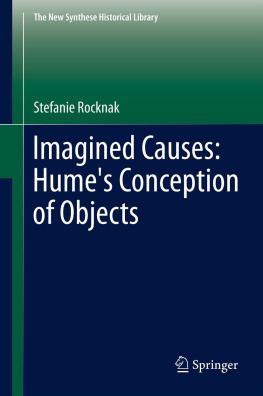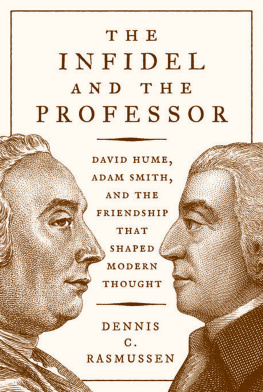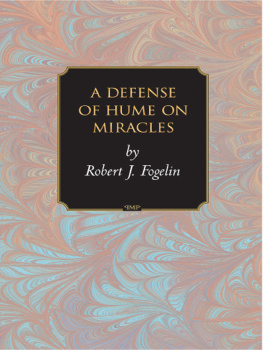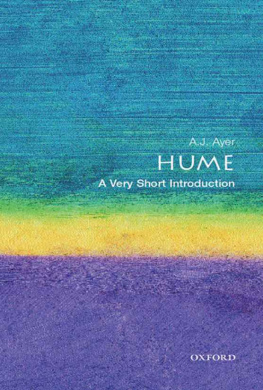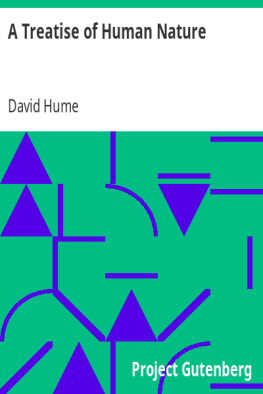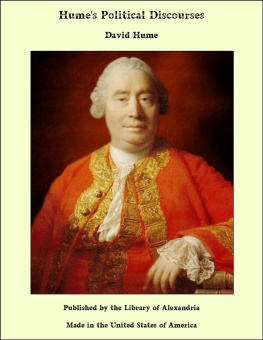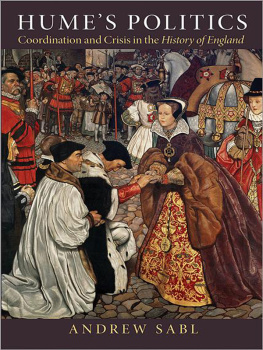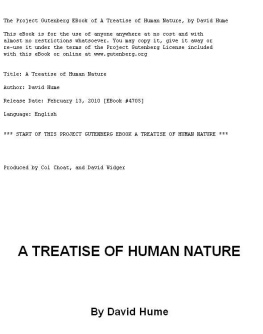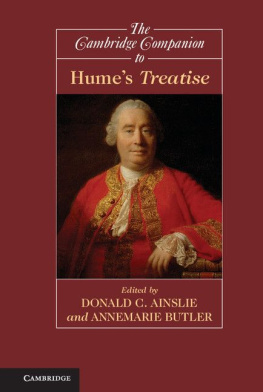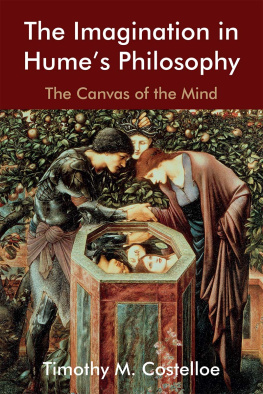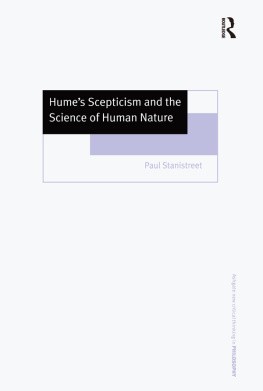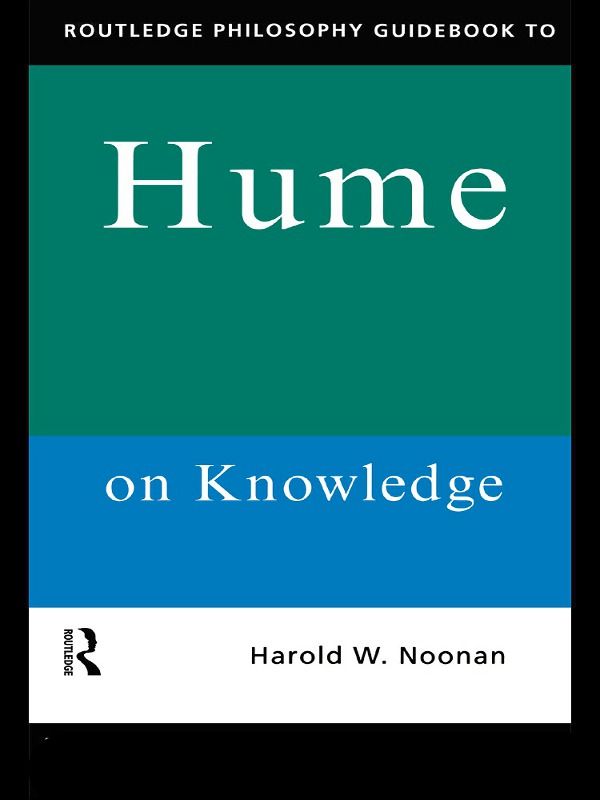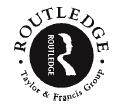Routledge Philosophy GuideBook to
Hume
on knowledge
This book is written with admirable clarity, contains concise and helpful historical background, examines all the major issues in Humes epistemology including important sections of the Treatise which are all too often skipped over, and gives a good sense of scholarly controversies among commentators on the Treatise. It is an excellent introduction to Hume for both undergraduates and beginning graduate students, and contains material which should be of interest even to Hume scholars.
Francis W.Dauer, University of California, Santa Barbara
This book gives us an accessible and philosophically sound discussion of the main themes of Humes Treatise.
R.S.Woolhouse, University of York
David Hume (171176) is one of the greatest figures in the history of British philosophy. Of all of Humes writings, the philosophically most profound is undoubtedly his first, A Treatise of Human Nature. Of the three books that make up the Treatise, the first, in which he outlines the epistemology and metaphysics underpinning his system, is universally acknowledged to be his greatest intellectual achievement.
Hume on Knowledge thus provides us with a map to Book 1 of the Treatise and sets out its principal ideas and arguments in a clear and readable way.This book will enable any reader coming to the Treatise for the first time easily to understand the importance of and intricacies inherent in Humes thought.
Harold W.Noonan is a Reader in Philosophical Logic at the University of Birmingham. He is the author of Objects and Identity and Personal Identity (available from Routledge).
Routledge
Philosophy
GuideBooks
Edited by Tim Crane and Jonathan Wolff
University College London
Kant and theCritique of Pure Reason
Sebastian Gardner
Mill on Liberty
Jonathan Riley
Mill on Utilitarianism
Roger Crisp
Wittgenstein and thePhilosophical Investigations
Marie McGinn
Heidegger andBeing and Time
Stephen Mulhall
Plato and theRepublic
Nickolas Pappas
Locke on Government
D.A.Lloyd Thomas
Locke on Human Understanding
E.J.Lowe
Spinoza and Ethics
Genevieve Lloyd
LONDON AND NEW YORK
Routledge Philosophy GuideBook to
Hume
on knowledge
Harold W.Noonan
First published 1999 by Routledge
11 New Fetter Lane,
London EC4P 4EE
Simultaneously published in the USA and Canada
by Routledge
29 West 35th Street, New York, NY 10001
Routledge is an imprint of the Taylor &Francis Group
This edition published in the Taylor & Francis e-Library, 2003.
1999 Harold W.Noonan
All rights reserved. No part of this book may be reprinted or reproduced or utilised in any form or by any electronic, mechanical, or other means, now known or hereafter invented, including photocopying and recording, or in any information storage or retrieval system, without permission in writing from the publishers.
British Library Cataloguing inPublication Data
A catalogue record for this book is available from the British Library
Library of Congress Cataloging inPublication Data
Noonan, Harold W.
Routledge philosophy guidebook to
Hume on knowledge/Harold W.
Noonan.
p. cm.
Includes bibliographical references and index.
1. Hume, David, 17111776.
Treatise of human nature.
Book 1. 2. Knowledge, Theory of.
3. Philosophy of mind. I. Title.
B1489.N66 1999
128dc21 9914365
ISBN 0-203-01450-2 Master e-book ISBN
ISBN 0-203-22450-7 (Adobe eReader Format)
ISBN 0-415-15046-9 (hbk)
ISBN 0-415-15047-7 (pbk)
To the memory of Barrie Falk (194098)
Preface
In this book I present a study of the most important themes in Book 1 of Humes first, and greatest, work: A Treatise of Human Nature. The exposition follows the order in which these themes appear in the Treatise. Thus, after an introductory chapter outlining the background to Humes thought and relating Book 1 of the Treatise to the rest of his work, the second chapter examines Humes theory of the mind, as found in Part I of Book 1; the third chapter is devoted to Humes discussion of causation, induction and the idea of necessary connection in Part III; and the remaining two chapters are concerned with the most significant and influential of Humes discussions in Part IV: Section 2, on belief in the external world, and Section 6, on personal identity.
I am grateful to my colleagues at the University of Birmingham for the patience with which they have read and commented on successive redraftings of this material.
References have been given in general according to the Harvard referencing system. However references to Lockes An Essay ConcerningHuman Understanding are by book, chapter and section. Other occasional exceptions to the Harvard system are explained in the bibliography.
H.W.N.
Chapter 1
Introduction
Humes life and work
Humes life and times
David Hume, the last of the so-called three great British empiriciststhe others being Locke (1632 1704) and Berkeley (16851753)was born on 26 April 1711, in Edinburgh, seven years after the death of Locke and when Berkeley was a young man of 26.His father was Joseph Home of Ninewells, a small landholding in Berwick-on-Tweed (David adopted the spelling Hume when he left Scotland in 1734 to avoid mispronunciation by the English). His family were quite prosperous gentry and strict Presbyterians.
Humes father died when he was only two and his mother never remarried. He was a precocious reader, described by his mother as uncommonly wake-minded, and in 1722 the family moved to Edinburgh so that he and his brother John could study at Edinburgh University. Hume matriculated at Edinburgh University in 1723 at the age of 12this was younger than was usual but not exceptionally so.There he acquired a grounding in the classical authors, logic and metaphysics, natural philosophy, ethics and mathematics.In his brief autobiography My Own Life (1993b:3516) he describes this period of his life thus:
I passed through the ordinary course of education with success, and was seized very early with a passion for literature, which has been the ruling passion of my life, and the great source of my enjoyment. My studious disposition, my sobriety, and my industry, gave my family a notion that the law was a proper profession for me, but I found an insurmountable aversion to everything but the pursuits of philosophy and general learning; and while they fancied I was poring over Voet and Vinnius, Cicero and Virgil were the authors I was secretly devouring.
(1993b:351)
Hume left Edinburgh University without taking a degree and abandoned his half-hearted study of law by 1729 when he embarked upon the philosophical study that was to lead to his writing of


